8 Best Crypto Mining Pools in 2024 (Without Expensive Equipment)
Why are we talking about the best crypto mining pools? Is mining still profitable?
Even in 2024, mining crypto remains an attractive income stream for many. However, not everyone can afford the expensive mining hardware, equipment, and electricity costs it requires to make mining a profitable business venture.
That is where crypto mining pools come in. Today, we’ll discuss what crypto mining pools are, how they work, factors to consider when choosing a platform, and, of course, the best crypto mining tools of 2023:
What is a Crypto Mining Pool?
We already know how crypto mining works – miners solve complex mathematical puzzles to validate transactions on the blockchain to earn rewards. It’s called the proof-of-work consensus mechanism, used by many cryptocurrencies, including Bitcoin.
But what does it require to solve these complex mathematical problems?
Computing power. A lot of it.
In the early days, miners went solo, hoping to strike it rich by solving these puzzles on their own. However, as cryptocurrencies grew in popularity, these math problems became incredibly challenging, making solo mining less profitable for individual miners.
This is where mining pools come into play. They are like a team of miners joining forces to increase their chances of solving puzzles and earning rewards.
How does it work?
Miners contribute their computing power to the pool. So, when the pool successfully validates a block of transactions, the rewards are distributed among the members based on their contributed computing power. It’s a way to level the playing field and ensure a steady income for miners, regardless of their individual computing resources.
There are a lot of crypto mining pools out there. Some good, some bad. But to choose the one that best suits your needs and goals, you must first know what factors matter the most and why they matter, which leads us to…
How Do you Choose a Crypto Mining Pool in 2023?
The following are essentially the most important factors grouped in five categories (+1 bonus) that you should consider when choosing the best crypto mining pools in 2023.
Pool Reputation and Reliability
Reputation is a direct indicator of how reliable a platform is. So, look for feedback and reviews from the other miners and users in online forums, social media, and mining communities.
Other than that, pay attention to the following characteristics when assessing pool performance:
- Hash rate and Reliability: Look for a pool with a substantial hash rate, indicating a strong and reliable network. Higher hash rates typically result in more frequent block confirmations, while smaller pools might provide higher payouts per miner but less frequently.
- Uptime: A reliable mining pool should have minimal downtime to ensure consistent mining operations. Research the historical uptime record to assess the pool’s reliability.
- Low Stale Share Rate: A low stale share rate implies that a pool efficiently communicates with miners, reducing the chances of wasted efforts due to outdated work assignments.
As for security, ensure that the platform is employing standard security practices and features, like two-factor authentication (2FA) and SSL encryption.
Lastly, prioritize transparency. It’s what draws the threads together on all the elements discussed above, creating greater trust.
Rewards, Payouts and Fees
Most crypto mining pools employ one of the following reward systems or some variation of it:
- Proportional: In a proportional system, miners are rewarded based on their contributed computing power. This approach is suitable for steady, predictable earnings.
- PPLNS (Pay Per Last N Shares): PPLNS rewards miners based on the number of shares they contributed to the last N rounds, which can lead to variable payouts.
- PPS (Pay Per Share): PPS offers a fixed payout for each share contributed, making it a predictable choice but with slightly lower potential rewards.
Different pools have varying payout schedules. Some offer regular, smaller payouts, while others provide larger but less frequent rewards.
Also, check the minimum payout threshold. It’s the amount of coins you must mine before you can withdraw your rewards. Make sure these variables align with your goals.
As for fees, most crypto mining pools often charge a percentage of your earnings as a fee. However, some platforms may have a fixed fee structure. Look into it.
Supported Cryptocurrencies
This is pretty obvious but still worth mentioning – ensure the pool you choose supports the cryptocurrency you want to mine. Some pools specialize in specific coins, while others offer a range of options.
User Experience and Tools
A user-friendly interface makes it easier to monitor your mining progress, view earnings, and manage your settings, while advanced monitoring tools can help you optimize your mining setup for maximum efficiency. Choose one that best suits your current level of expertise.
Geographic Considerations
Choose a pool with servers located geographically close to your mining setup. This reduces latency and ensures a smoother mining experience.
Additional Features and Support
Some pools offer features like merged mining, where you can mine multiple cryptocurrencies simultaneously. Others might allow you to set custom payout thresholds or offer backup pools to switch to in case of issues. The bottom line is you want to keep your eyes open for additional features that may be useful to you.
Last but not least – support. When you encounter a technical issue, how quickly and well the customer support handles your problem can single-handedly determine your overall experience with the platform. So, choose a crypto mining pool with responsive customer support and an active community, as they can be crucial when you need assistance.
1. Binance Pool
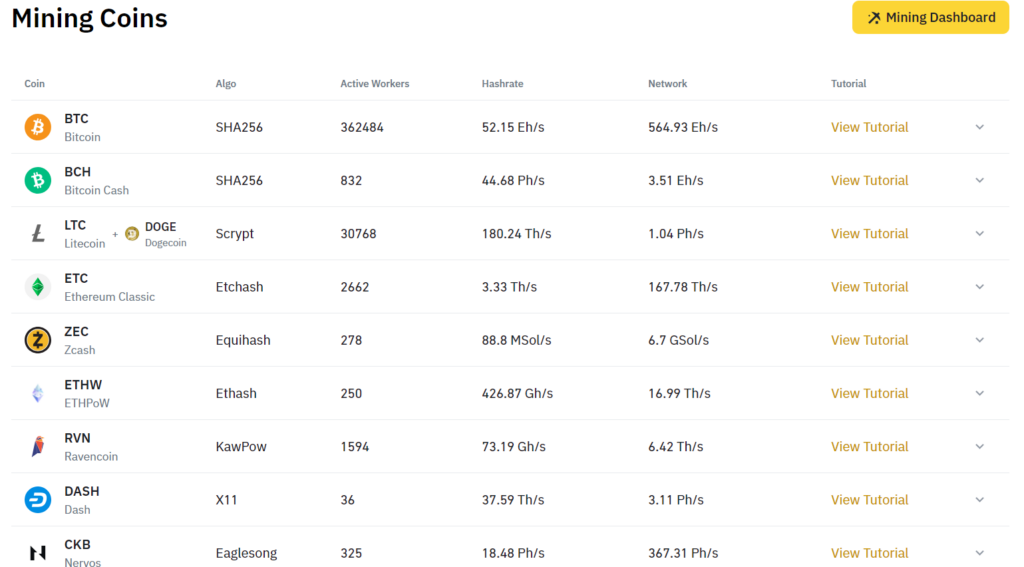
With a solid reputation in the industry, Binance Pool benefits from the robust infrastructure of one of the largest crypto exchanges globally.
Pool Performance: The platform boasts a high hash rate of 60-95 Th/s and uses the SHA256 algorithm.
Rewards and Payout: Binance Pool employs the FPPS, PPS+, and PPS earning models, depending on the coin and instant settlements. For more info on its earning model, click here.
Fees: The platform offers competitive fees, ranging from 1-4% (fees for Bitcoin mining is 4%).
Supported Cryptocurrencies: The platform supports up to 8 cryptocurrencies for mining, including BTC, BCH, and BSV.
User Experience and Tools: The interface is very simple and user-friendly. Users can easily navigate and find all the relevant information, like hash rate, rewards, fees, etc.
Binance pool also offers an auto-switching feature, meaning you can switch from one mining algorithm to another to mine different cryptocurrencies, resulting in greater profits. Not only this, the platform also allows you to sell your hash rates.
Overall, Binance Pool is easily one of the best crypto mining pools in 2023, if not THE best.
2. Braiins Pool (Slush Pool)
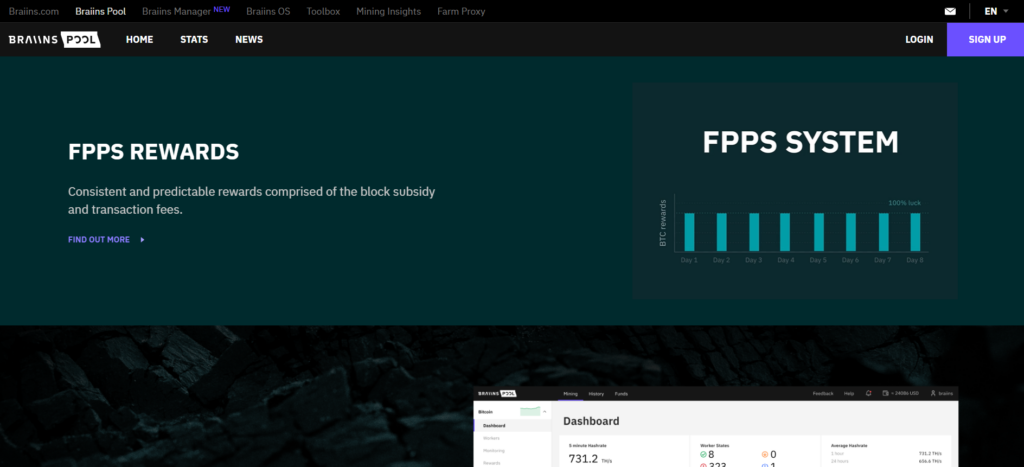
Braiins Pool, formerly known as Slush Pool, is one of the biggest and best crypto mining pools after PEGA Pool, which recently (temporarily) shut down.
Pool Performance: The platform boasts a high hash rate of 5.98 EH/S and has mined over 1.3 million Bitcoin until now.
Rewards and Payout: The platform offers a customizable payout schedule, meaning you can withdraw your rewards monthly, weekly, daily, or even instantly if you reach certain thresholds.
The reward model for Braiins Pool, however, is a little more complex than the average crypto mining pool. Check out their official Rewards and Payouts page for detailed info.
Fees: Braiins Pool charges a 2% fee on Bitcoin mining and a 0.0001 BTC payout fee on payouts below 0.01 BTC.
Supported Cryptocurrencies: The platform currently only supports Bitcoin mining.
User Experience and Tools: Although the user interface is quite elegant and simple, it may not be suitable for complete beginners due to its usage of complex language and lack of guiding resources.
The only potential downside of Braiins Pool is that it only supports one cryptocurrency. Other than that, Braiins Pool offers competitive fees, decent rewards, and, most importantly, one of the best 24/7 customer support in the industry.
3. F2pool
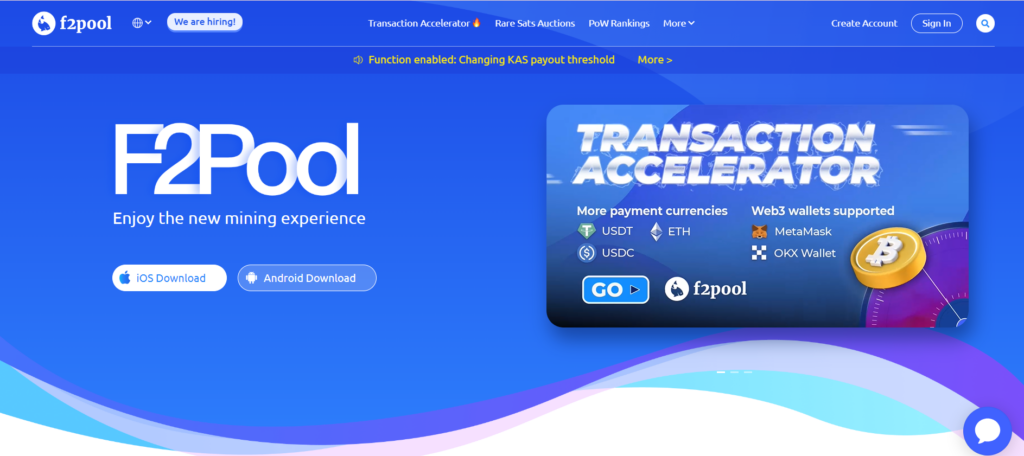
F2pool is one of the best crypto mining pools when it comes to the range of options and pool performance. Here’s why –
Pool Performance: F2pool boasts some of the highest hash rates with Bitcoin’s hash rate going up to 401.53EH/s.
Rewards and Payout: Binance Pool employs the FPPS, PPLNS, and PPS earning models, depending on the coin. Payout threshold and frequency also vary based on different cryptocurrencies.
Fees: F2pool typically charges 4% on FPPS, 2% on PPLNS, and 1-4% on PPS, depending on the token you’re mining.
Supported Cryptocurrencies: The platform supports up to 21 cryptocurrencies for mining, including BTC, LTC, and ETHW.
User Experience and Tools: The interface is user-friendly and intuitive, making it ideal for beginners.
Overall, F2pool is a great choice due to its features and offerings. Moreover, the platform has live chat support and robust security measures, adding to its appeal.
4. ECOS
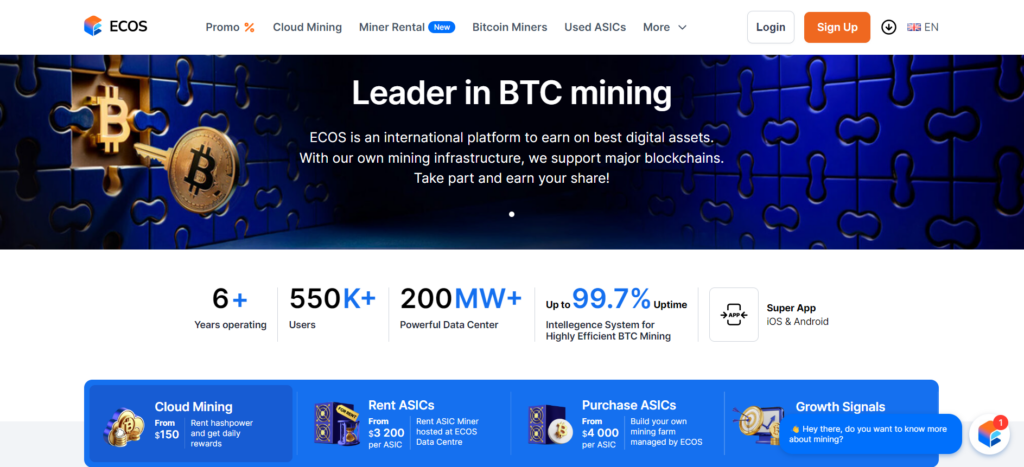
Launched in 2017, ECOS is one of the most reputed and trusted crypto mining pools on this list since it’s one of the few mining pool services providers operating under a legal license.
Pool Performance: The hash rate varies and depends on your contract value, with the minimum contract price and duration being $150 and 30 months, which comes with a hash rate of 3.79 TH/s.
Rewards and Payout: The rewards model once again differs from the usual ones. However, ECOS has a profitability counter that can help you estimate your mining rewards. As for payout, you can start withdrawing your rewards daily once you begin earning.
Fees: The platform charges $0.05 for 1 TH per day.
Supported Cryptocurrencies: The platform only supports Bitcoin at the moment.
User Experience and Tools: ECOS has a user-friendly interface, suitable for both beginners and advanced miners.
What makes ECOS stand out among the other best crypto mining pools is – it lets new users try out cloud mining for free with a demo contract. This helps people understand the process better, leading to better decisions and contracts.
5. ViaBTC
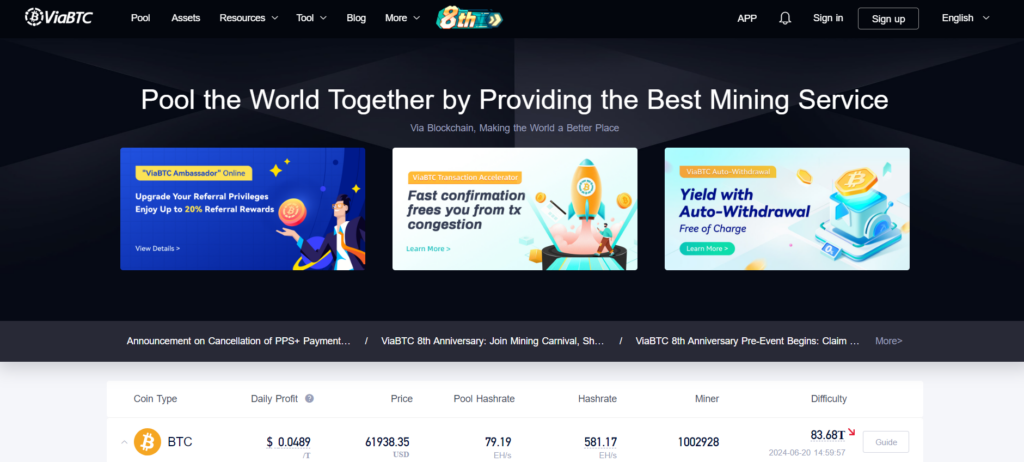
With its advanced mining tools, a wide range of cryptocurrency support, and competitive fees, ViaBTC is undoubtedly one of the best crypto mining pools in 2023. This is what the platform offers:
Pool Performance: ViaBTC has varying hash rates for different coins. Bitcoin has a hash rate of 38.59EH/s, while Litecoin’s hash rate is 269.98TH/s.
Rewards and Payout: The platform supports PPS+, PPLNS, and SOLO reward models. As for payouts, you can withdraw every day if you meet the minimum payout threshold for different cryptocurrencies. Bitcoin’s minimum payout threshold is 0.001 BTC.
Fees: The platform charges varying fees for different reward models. For instance, it charges a 4% fee for the PPS+ system and a 2% fee for the PPLNS system. Here is the complete fee structure.
Supported Cryptocurrencies: The platform supports up to 11 cryptocurrencies for mining, including BTC, BCH, and LTC.
User Experience and Tools: ViaBTC offers an intuitive interface and many mining tools, making it an ideal platform for veteran miners. However, it’s also user-friendly enough for beginners.
As a side note, ViaBTC uses some of the most robust security systems to ensure user safety.
7. Antpool
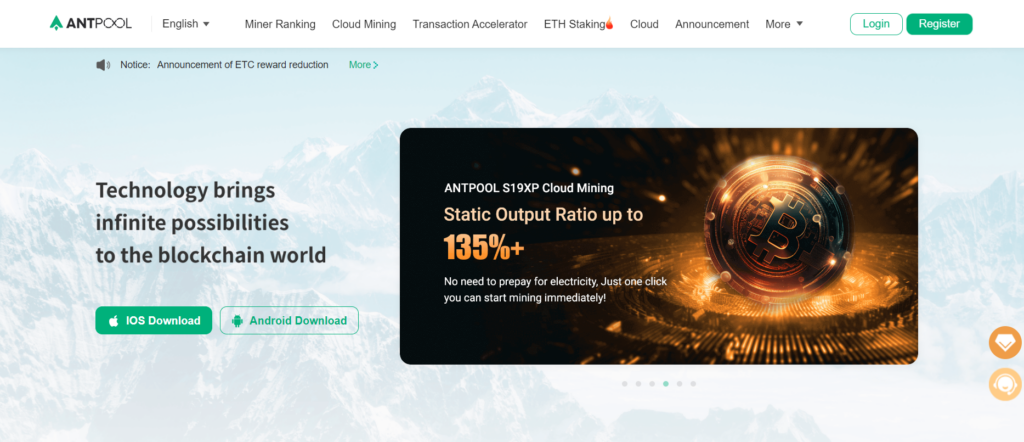
Antpool is one of those few platforms that allows its users to choose from multiple reward models. But that is not all, it also comes with incredible pool performance and amazing features.
Pool Performance: Antpool boasts hash rates as high as 878.87TH/s on Litecoin, while Bitcoin’s hash rate is around 407.77EH/s. These are considerably higher numbers than some of the other entries in this list.
Rewards and Payout: The platform employs the FPPS, PPS, PPLNS, and more reward modes. Additionally, daily payouts are available with a minimum payout threshold set for different cryptocurrencies. For instance, the minimum payout threshold for Bitcoin is 0.001 BTC.
Fees: The platform offers competitive fees, ranging from 1-4%. Fees for Bitcoin mining in FPPS mode is 4%, while there are no fees with PPLNS.
Supported Cryptocurrencies: Antpool supports up to 15 cryptocurrencies for mining, including BTC, BCH, and LTC.
User Experience and Tools: Antpool has a clean and minimalistic interface. Additionally, the platform offers many support and management tools to enhance the user experience.
One of the major strengths of Antpool is its dedicated user support whether that is through Mail, SMS, WeChat notifications, or easy-to-use mobile apps.
8. Poolin
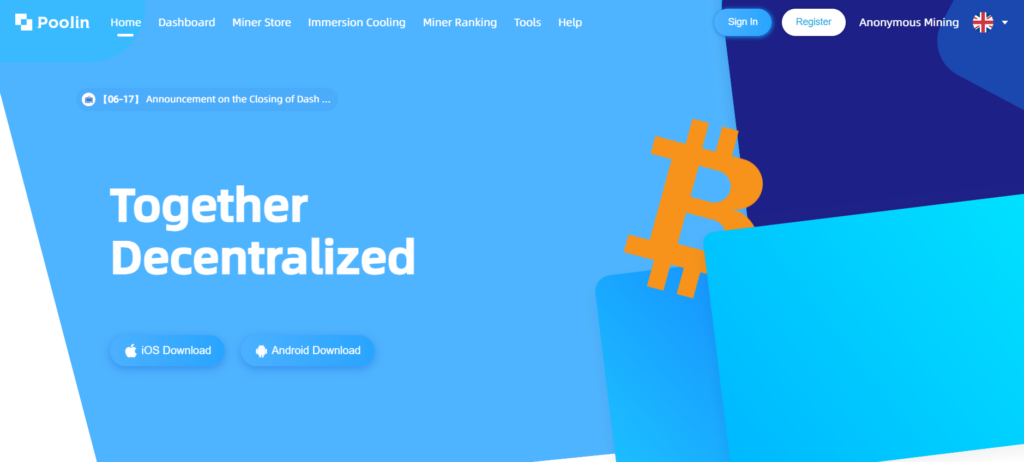
The China-based Poolin, launched in 2017, has made it to this list among the best crypto mining pools due to its impressive pool performance and range of earning models.
Pool Performance: Poolin has particularly high hash rates. For instance, Bitcoin’s hash rate is 3.81 EH/s.
Rewards and Payout: The platform offers a range of earning models, including PPS, PPS+, Solo, PPLNS, and FPPS. Payout is daily as long as you meet the minimum payout threshold. Bitcoin’s minimum payout threshold is 0.005 BTC.
Fees: The platform offers competitive fees, ranging from 0-4%, depending on the coin and earning model. Bitcoin supports FPPS and PPS, with a fee of 4%.
Supported Cryptocurrencies: The platform supports up to 11 cryptocurrencies for mining, including BTC, LTC, and ETHW.
User Experience and Tools: Poolin has a highly efficient and clean user interface. Additionally, there is also a daily earning calculator for every coin to get estimated earning figures.
FAQ
Are crypto mining pools profitable?
Yes, crypto mining pools can be profitable. By joining a mining pool, miners combine their computing power, increasing their chances of successfully mining cryptocurrency and receiving regular rewards.
While individual payouts may be smaller compared to solo mining, the consistent income stream provided by mining pools can make them a profitable choice, especially when considering the reduced risk and steadier returns.
However, profitability depends on factors like the chosen cryptocurrency, mining equipment, pool fees, and overall market conditions. It’s essential to research and choose the right pool to maximize your profitability.
Which mining pool is most profitable?
While there is no binary answer to this question, NiceHash seems to be the most profitable crypto mining pool for Bitcoin. However, profitability can vary depending on several factors, including the specific cryptocurrency you’re mining, your mining equipment, and market conditions. Plus, profitability can change over time.
To determine which mining pool is currently the most profitable for you, it’s essential to consider factors such as the pool’s hash rate, fees, supported cryptocurrencies, and your own mining setup. You may want to use mining profitability calculators and monitor market trends to make an informed decision based on your unique situation.
Can I mine Bitcoin for free?
It’s not feasible to mine Bitcoin for free in the traditional sense due to the significant investment it requires in specialized mining hardware, electricity, and cooling systems. However, there are a few scenarios where you might come close to “free” Bitcoin mining:
Low-Cost Electricity: Access to exceptionally cheap or free electricity can lower mining expenses significantly.
Cloud Mining Promotions: Some cloud mining services offer limited free trials or promotional deals, although they come with restrictions and risks.
Joining Mining Pools: While not free, mining pools allow you to share costs and rewards with others, reducing the initial investment compared to solo mining.
Are mining pools safe?
Mining pool safety depends on factors like reputation, security measures, and transparency. Choose well-known pools with transparent operations, secure protocols, and reasonable fees. Check user reviews and consider diversifying your mining efforts across multiple pools to mitigate risks. While most pools are safe, diligence is essential in the cryptocurrency mining landscape.
Which crypto is the fastest to mine?
Cryptocurrencies like Litecoin (LTC), Dogecoin (DOGE), Bitcoin Cash (BCH), and Monero (XMR) are often considered faster to mine than Bitcoin due to their less intensive algorithms or lower network difficulties. However, mining speed depends on factors like hardware and market conditions, and what’s “fast” can vary.
Are mining rewards taxable?
Mining rewards are typically subject to taxation in many countries. In general, mining rewards are considered taxable income, and the value of the cryptocurrency at the time of receipt is used to determine the taxable amount. Additionally, if you later sell the mined crypto at a profit, you may be subject to capital gains tax.
Check out our in-depth guide on crypto mining taxation.